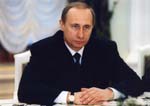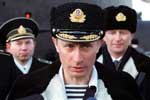President
 The President of the Russian Federation is Vladimir Vladimirovich Putin.
The President of the Russian Federation is Vladimir Vladimirovich Putin.
He was elected on March 26, 2000 for 4-year term.
He assumed office on 7th May 2000 (before that - acting as the President since December 31, 1999).
The President of the Russian Federation is the head of the state and guarantor of the Constitution of the Russian Federation, human rights and freedom.In accordance with Constitution of the Russian Federation the President takes appropriate measures to protect sovereignty, independence and state integrity of the Russian Federation, provides functioning and cooperation of government organs. In accordance with Constitution of the Russian Federation and federal laws the President determines main directions of internal and foreign policy of the state. As the head of the state, the President of Russian Federation represents the Russian Federation in foreign affairs and within the country.
The President issues decrees and arrangements, which must not confront Constitution of the Russian Federation and federal laws.The President of the Russian Federation has immunity.The Constitutional Co urt has quite a wide interpretation of 'Guarantor of Constitution', allowing, for instance, the President to issue a decree concerning legislative matters until appropriate law is passed. urt has quite a wide interpretation of 'Guarantor of Constitution', allowing, for instance, the President to issue a decree concerning legislative matters until appropriate law is passed.
AUTHORITIES OF THE PRESIDENT
The President of the Russian Federation appoints the Prime Minister of the Russian Federation (by the State Duma approbation); the Deputies of the Prime Minister and Ministers of the Cabinet (by the Prime Minister's recommendation).The President has the right to preside at the Cabinet meetings, to decide about the Cabinet resignation.
Besides, the President of the Russian Federation appoints:
the plenipotentiaries of the President of the Russian Federation,
the high command of armed forces,
diplomatic representatives of the Russian Federation in foreign countries and international organizations (after consultation with committees and commissions of the Federal Assembly),
federal judges (except judges of the Constitutional, Supreme, High arbitration courts);
forms:
the administra tion of the President of the Russian Federation; tion of the President of the Russian Federation;
the Security Council of the Russian Federation (also heads it);
represents nominees:
to the State Duma - for the post of the Chairman of the Central bank of the Russian Federation;
to the Council of Federation - for the post of judges of the Constitutional Court, the Supreme Court, the High arbitration court, and also the General public prosecutor of the Russian Federation.
Also: approves the military doctrine of the Russian Federation;
introduces Bills before the State Duma;
signs and promulgates federal laws;
appoints elections of the State Duma;
dismisses the State Duma in the cases and in the order stipulated by Constitution of the Russian Federation; appoints a referendum;
enters martial law or state of emergency in the territory of the Russian Federation or in its separate districts;
solves questions of citizenship, grants a political asylum;
posts rewards; instates honorary titles and high military ranks; issues pardons.
He is the Supreme Commander-in-Chief of the armed forces of the Russian Federation.
POWER STRUCTURE
The Supreme Court of the Russian Federation
President
Government of the Russian Federation
Security Council
Judicial Authority
Executive Authority
Federal Assembly
|